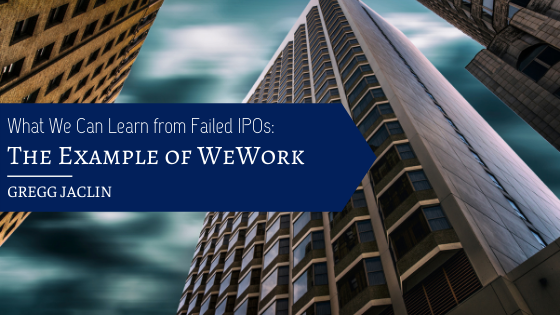The recent WeWork IPO fiasco wasn’t the only failed initial public offering in recent memory, but the company’s spectacular implosion last year was the result of a serious set of underlying problems.
As business leaders and entrepreneurs, we may find the discussion of failed IPOs to be something of a deeply troubling experience; after all, no new business wants to be in the position of watching their newly-introduced stock plummet into the earth like a burned-out satellite.
But talking about the reasons behind failed public stock offerings can also be a learning experience. Sometimes, knowing what not to do as an entrepreneur is just as important as knowing what to do.
WeWork: A Case Study in What Not to Do
WeWork is an especially salient example of this principle because the company was hyped beyond belief for much of its existence. It is not a stretch to say that the company’s executives lived like rock stars. Indeed, only a few years ago, the start-up was seen as one of the most revolutionary businesses in the real estate industry. (Of course, it didn’t matter to investors that WeWork branded themselves as a tech firm in order to better court Silicon Valley venture capital money.)
So what changed between 2017 and 2019? Analysts are still trying to figure out what exactly went wrong at WeWork, but it is clear that the fault lines were there at the company even if they weren’t visible to investors only two years ago.
- Leadership Were Too Selfish
Even when WeWork was the darling of the start-up world, the company’s employees could see that money was essentially being burned by the truckload by WeWork executives. As the company was hemorrhaging money, the business’s “leaders” were laying off employees while hosting lavish parties. In any sane business environment, actions like these would drive investors to the exit aisles.
- Company Leaders Were Insincere and Manipulative
But investors didn’t. And that could be down to former WeWork CEO Adam Neumann’s gift of gab. Indeed, in the run up to the WeWork IPO, no one talked a bigger game than Neumann. And as long as you have the skills of a Michael Jordan or a Kobe Bryant, there is nothing wrong with talking a big game. When you’re the business equivalent of a lunchtime basketball team from Scranton, however, it’s probably best to dial your arrogance back a bit.
But dialing things back was not Neumann’s style. The entrepreneur was brash when he should have been cautious; he was arrogant to the point of being deceitful when he should have been open with his investors.
For all intents and purposes, in fact, Neumann essentially conned his backers in order to enrich himself. In the business world, that kind of untrustworthiness can torpedo any chances of a company’s success. For a globally-hyped company like WeWork, the results produced a Chernobyl-style meltdown.
- Investors Bought the Hype
To many outside observers, the business model of WeWork seemed almost incomprehensible. But some investors in Manhattan and Silicon Valley aren’t always outside observers looking in on a company’s performance; too often, such investors exist in a kind of echo chamber where a distorted version of reality takes precedence over common sense.
That bubble-logic backfired in a big way with WeWork. It is not hard to imagine that otherwise-capable investors in 2018 saw a young, charismatic CEO heading a hip, cutting-edge start-up and were blinded by the hype that surrounded the company.
Unfortunately, that kind of thinking can lead investors into hot water fast: Without a serious backup plan, a company that is hyped beyond belief may as well just be a room full of smoke and mirrors. Anyone who has read about the spectacular failure of the Fyre Festival knows that hype without substance is worthless: Just because a small army of Instagram influencers are spreading the gospel of your organization does not mean that your product or service has any merit.
- What the Future Holds
In all likelihood, it probably won’t be long before Silicon Valley falls in love with another hip young company that knows how to manipulate the global hype machine. But the public does not care about hype; most people simply want a quality product that provides a good return on an investment.
To wit, no one cares if Bill Gates looks and sounds like a particularly geeky math professor from your local community college; no one cared that Steve Jobs dressed in clunky dad shoes or wore outdated turtlenecks every day of his life.
People simply cared about the ability of these entrepreneurs’ companies to deliver on their promises and to provide quality products to their customers.
And that is a lesson that Adam Neumann and his investors failed to take into account. Sadly, it cost many of them dearly.

